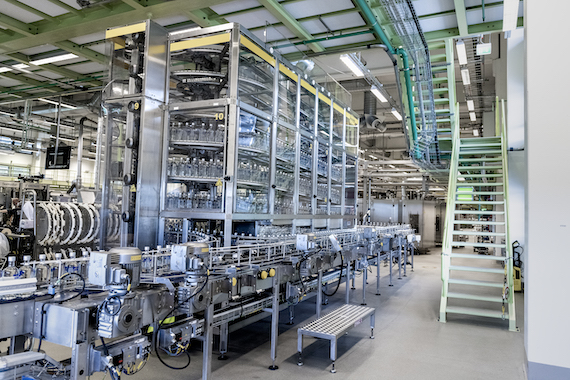Now with an all-new production line to increase capacity and meet consumer demand, Drinks International caught up with Absolut's vice president of operations, Anna Schreil, on the brand’s next steps.
PUSHING SUSTAINABILITY
As part of a wider goal to become carbon neutral, Absolut, in 2020, committed to its distillery being fossil-free before the end of 2025, around 92% of the energy used at the distillery already comes from green electricity and roughly 7% from green fuel, made in-house using waste spirits. Last year, less than 1% of the distillery’s remaining energy consumption came from liquefied petroleum gas (LPG) and since early September, this fossil-LPG has been replaced by bio-LPG, meaning the entire production of Absolut Vodka – 11.9m 9-litre cases in 2023 according to The Millionaires' Club – is fossil-free.
Despite this successful milestone, the quest for sustainability doesn’t end there. Schreil says the brand’s next step is “to focus on the emissions coming from the supply chain outside of our own production, primarily our raw materials and packaging materials - glass and wheat. For glass there are quite a few initiatives ongoing already with our bottle supplier. We have co-invested in a project with a hydrogen gas fuelled furnace to replace natural gas and that will be fuel efficient from December. We are optimising the processes and that will take 17% of the emissions from glass out of the system.” Not just in terms of the bottle itself, Absolut is also looking to optimise sustainability in its labelling. Currently the bottles feature printed labels which are hardened in ovens, however Schreil notes with technological advancements “we can potentially use another type of printing that requires lower temperatures for hardening”.
Schreil notes that on the wheat side, Absolut uses a ‘wheat cultivation concept’, essentially collaborating with farmers using incentives to encourage them to use procedures that will benefit sustainability and quality. “Even if we are fossil-free in our production, we still consume energy to fuel the distillery. Every kilowatt hour (a measure of how much electricity is used over time) that we can take out of the system is good, even if it’s green and made by hydrogen or hydro-powered, it’s still better if we cannot use it at all,” Schreil continues. “We are constantly obsessed with making our distillery even more efficient, I think it’s probably one of the most efficient distilleries in the world already with the metrics of how many kilowatt hours it takes to distil a litre of spirit.”

PRODUCTION INNOVATION
In terms of the production of the vodka, Absolut only produces what has already been ordered, with the warehouse being filled around 25 times throughout the year, and a bottle produced every couple of seconds, to put it into scale. The new production line will “secure the future capacity that we need”, says Schreil. “We have two bottling facilities in Âhus, there’s four production lines in one and only one line in the other, so now we’re investing in a second line in the latter, and then eventually we will move from four lines to three in the former”. The new line will replace an older one for which parts are no longer available when repairs are necessary.
“We are increasing capacity with the high speed line, while also ensuring what we have left can meet future demands for innovation. We thought about the local footprint and how to balance future demands into the needs of the manufacturing side. In the bottling plant with one line, that was not the plan from the beginning, it was built in 2007 and there was the plan to invest in a second line but thanks to the efficiency of it, that line was never needed until now. To work with what you have, and to make sure you optimise the usage of that, even if it’s machinery, is sustainability to me,” Schreil continues.
The vodka is created in this 24/7 cycle, which also requires operators to “ensure the product comes out at the right quality”, notes Schreil. As the brand looks ahead to further its sustainability efforts, while also meeting consumer demand, Shreil adds it’s “not a one-person show, everyone is a part of the process. Sweden has a long vodka-making history, as well as the availability of raw materials we have high yields of cultivating wheat, which is an excellent material to produce vodka. As a big player in a small community, responsibility has always been important”. It’s this responsibility which sees the brand continue to focus on its environmental impact, without compromising its production.




